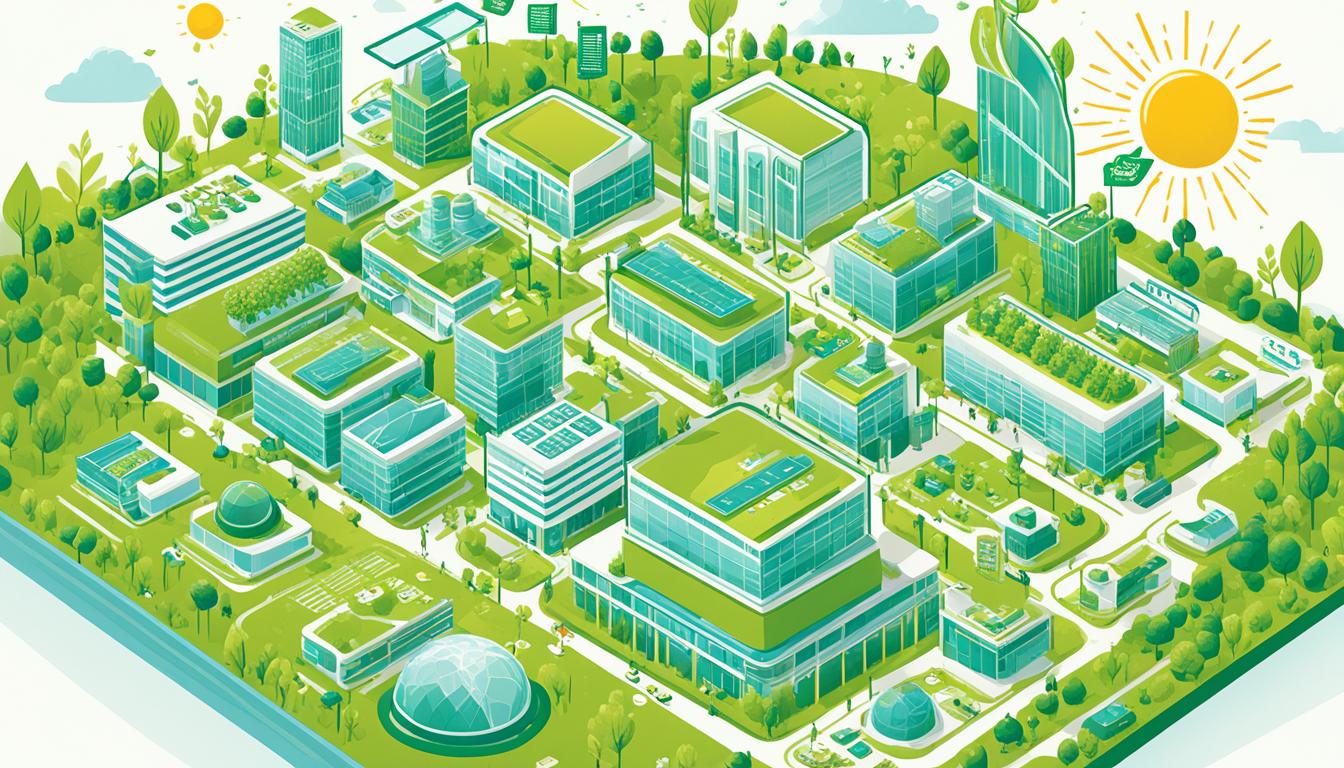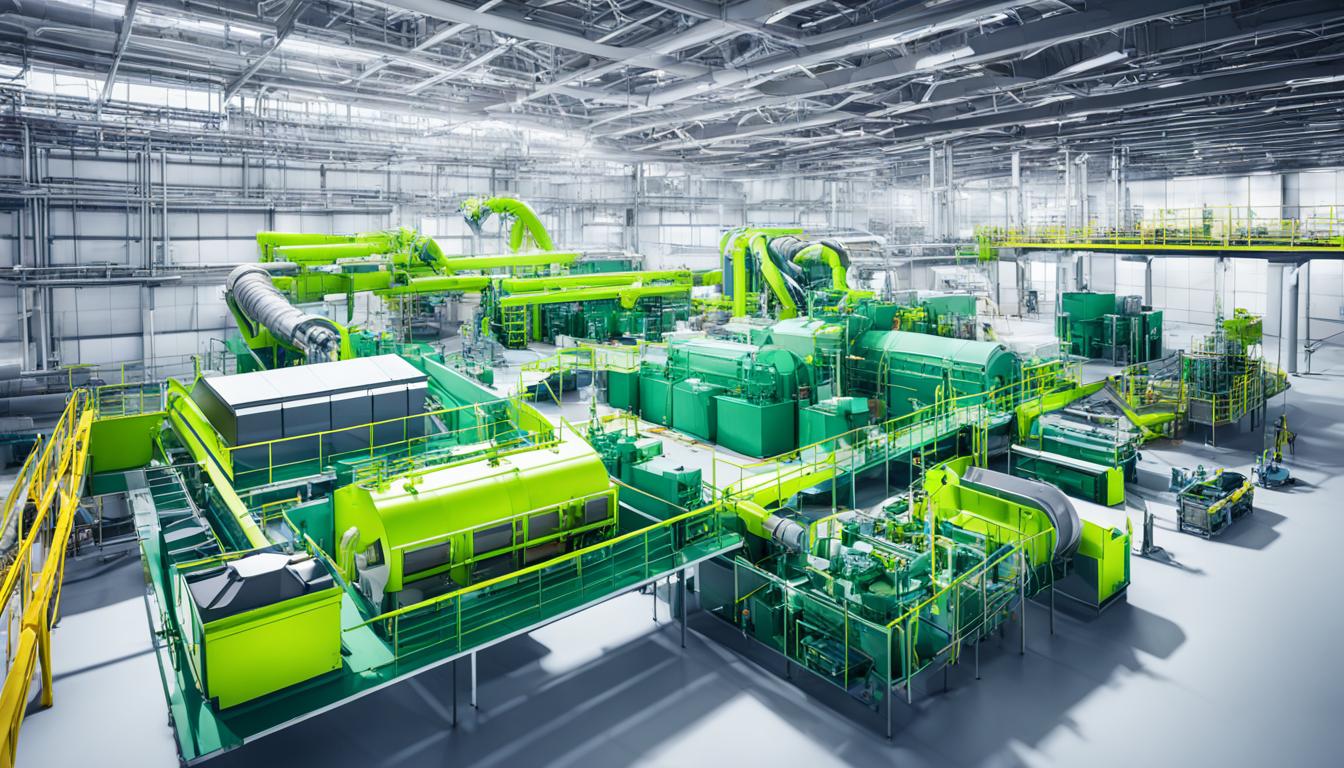Last Updated on December 9, 2025
In today’s fast-evolving economic scene, sustainable business practices are vital for companies aiming to increase revenue and enhance their reputation. More organizations are moving from talk to action, integrating eco-friendly policies. These policies not only fulfill regulatory demands but also align with investor expectations. As companies set goals to reach net-zero sustainability by 2050, there’s a strong focus on cutting Scope 3 emissions. These emissions play a big role in carbon footprints.
Recent global events have pushed businesses to adopt green practices more aggressively, especially with energy supply issues. Sustainability is more than a trend; it’s a core change in how businesses operate and interact with the environment. Studies show a growing number of consumers backing environmentally responsible businesses. A large majority prefers brands that put sustainability first. This shift opens up new chances for companies willing to innovate and move towards a sustainable future.
Let’s explore the main trends and innovations in the sustainable business world today.
Key Insights
- Organizations are increasingly focusing on sustainable business practices to enhance revenue and reputation.
- Many firms set targets to achieve net-zero sustainability goals by 2050, focusing on reducing Scope 3 emissions.
- Private capital is needed in frontier markets to tackle systemic challenges.
- Consumer demand for eco-friendly companies is rising as more individuals express concern about sustainability.
- Government mandates are shaping the sustainability reporting landscape, affecting compliance efforts.
- Data-driven sustainability practices are becoming more prevalent among emerging business leaders.
- Businesses adopting sustainability are seeing benefits in both market opportunities and financial outcomes.
The Shift Towards Sustainable Business Practices
Businesses are now integrating sustainable practices into their operations, marking a significant shift. This transformation goes beyond mere compliance, aiming to boost brand value. With 66% of consumers willing to pay more for sustainable brands, as Nielsen found, many firms are making sustainability a core strategy.
Environmental awareness and strict government regulations are driving this change. These laws push companies to lessen their environmental impact, leading to cost savings and efficiency gains. Sustainability reporting standards, like the Global Reporting Initiative (GRI), help firms share their efforts to cut down on ecological harm.
By embracing sustainable practices, companies can better manage risks linked to climate change and resource scarcity. The triple bottom line approach shows this evolution; firms now aim for profit, social welfare, and environmental sustainability. Corporate social responsibility (CSR) has become essential for modern businesses.
Creating a sustainable culture within a company requires engaging employees. Educating staff about sustainability initiatives boosts morale and fosters a sense of ownership. Offering paid time off for community service empowers employees and strengthens sustainability efforts.
Reviewing the supply chain reveals many ways to improve sustainability. Companies can adopt responsible sourcing, reduce resource use, and cut carbon emissions. New Belgium Brewing’s switch to wind power is a prime example of how such initiatives can positively impact the environment.

Understanding Corporate Social Responsibility
Corporate Social Responsibility (CSR) has become a key focus for business leaders in recent decades. It involves companies adopting ethical business practices to benefit society, not just profits. This shift includes activities like community engagement, fair labor practices, and sustainable sourcing.
Organizations like B Corporations, social purpose corporations, and low-profit limited liability companies have emerged. These entities are dedicated to stakeholder engagement and socially responsible actions. Companies now share their CSR efforts through detailed reports, ensuring transparency and accountability.

The triple bottom line concept is vital for evaluating a company’s impact. It balances social, environmental, and financial outcomes. CSR encompasses environmental stewardship, philanthropy, ethical practices, and economic responsibility. These efforts bring numerous benefits, such as better marketing, higher employee engagement, and attracting compatible talent.
Studies show that CSR can lead to improved brand recognition. A Journal of Consumer Psychology study found that consumers prefer companies with strong CSR initiatives. Moreover, companies leading in environmental, social, or governance areas often see valuation premiums.
CSR also helps in reducing employee turnover and creating a positive work culture. By prioritizing ethical business practices, companies foster fairness and respect among stakeholders. The Corporate Responsibility Magazine’s top 100 Best Corporate Citizens list highlights companies excelling in employee relations, environmental impact, and human rights.
Companies like Starbucks, Home Depot, and General Motors are setting ambitious goals for sustainability and social impact. Their commitments reflect a strong dedication to CSR, leading to broader socioeconomic benefits. This approach sets the stage for a better future.
Sustainable Business: Key Trends for 2024
As we step into 2024, businesses are focusing more on setting realistic sustainability goals. The pressing issue of climate change, with 2023 being the warmest year on record, is pushing a shift from overambitious targets to more feasible ones. This change helps organizations align their actions with the current environmental state and tackle urgent social issues.
Increased Focus on Realistic Sustainability Goals
Companies are reevaluating their sustainability pledges, recognizing the need for goals that are measurable and attainable. Research shows that a limited number of firms with net-zero plans have solid strategies to reach these goals. This highlights the significance of crafting detailed plans that focus on environmental standards and ethical considerations like human rights and community involvement. As ESG and regulatory standards become stricter, prioritizing these aspects is more crucial than ever.
Emerging Regulations and Compliance Standards
Businesses must keep up with evolving regulations, including mandatory sustainability disclosures like the European Union’s Corporate Sustainability Reporting Directive (CSRD). This directive demands firms to openly share data on their climate impact and social performance. Companies will struggle with measuring and managing sustainability issues throughout their supply chains. The emphasis on compliance standards will push organizations to refine their sustainability efforts, navigating the challenges posed by geopolitical uncertainties and market dynamics.
Innovations in Clean Energy Adoption
The shift towards clean energy is vital for businesses looking to boost their sustainability. The green tech sector is growing, making companies realize the value of renewable energy solutions. This move benefits the environment and also leads to significant cost savings.
Transitioning to Renewable Energy Sources
Many businesses are now focusing on renewable energy to support their clean energy goals. By switching to solar and wind power, companies are cutting down on carbon emissions. This transition brings about a notable decrease in operational costs, thanks to increased investments in renewable energy technologies.
- Investments in renewable technologies highlight the growing trend towards sustainability.
- Switching to clean energy sources leads to a significant reduction in carbon footprints for organizations.
- Renewable energy initiatives also open up new job opportunities in the green tech sector.
The Role of Energy Efficiency Measures
Energy efficiency is just as important as renewable energy. Smart technologies help by monitoring energy use and pinpointing areas for improvement. Engaging employees in sustainability efforts has shown to improve energy efficiency, with many companies seeing positive results.
- Advanced software and data analytics help businesses track their environmental impact effectively.
- Emerging technologies like IoT and blockchain are changing supply chain management and making clean energy more accessible.
- Addressing challenges such as high upfront costs and the variability of renewable energy can help companies adopt energy-efficient practices successfully.

Enhancing Supply Chain Sustainability
Businesses are now recognizing the critical role of supply chain sustainability. It’s vital to address environmental impacts across the entire chain. Scope 3 emissions account for over 90% of a company’s greenhouse gas emissions. This calls for strategic planning and collaboration with suppliers.
Addressing Scope 3 Emissions
Many multinational corporations are making commitments to fair labor and environmental practices with their suppliers. This not only helps the planet but also boosts their reputation among consumers who prioritize sustainability. Yet, challenges remain. Suppliers at lower tiers often find it hard to meet sustainability standards, posing risks across financial, social, and environmental fronts.
Brands that champion social and environmental responsibility in their supply chains reap long-term rewards. Several leading companies have set high sustainability goals, aiming to pass on their best practices to lower-tier suppliers. Exploring strategies to boost supply chain sustainability through technology and training can foster positive supplier relationships.
Utilizing Eco-friendly Packaging Solutions
The importance of eco-friendly packaging in a sustainable supply chain cannot be overstated. Companies are now focusing on packaging materials that reduce environmental impact and support social equity. This approach meets legal standards, like California’s Transparency in Supply Chains Act and the EU’s Conflict Minerals Regulation, ensuring transparency in sustainable practices. Sustainable procurement policies not only improve a company’s image but also build consumer trust.
For effective supply chain management, organizations should leverage platforms like Sedex for valuable data. Over 85,000 businesses use these tools to enhance sustainability. With technology’s growing role in managing supply chain challenges, companies can better navigate towards their sustainability goals.
Data-Driven Approaches to Sustainability
In today’s business world, the move towards data-driven strategies is reshaping the sustainability landscape. Companies now understand that precise data tracking and analytics are crucial for solid sustainability reporting. This shift is not just a passing trend but a vital step towards adhering to new regulations and meeting stakeholder expectations.
Leveraging Technology for Efficient Reporting
Technology is revolutionizing how businesses approach sustainability reporting. Advanced analytics tools help companies collect data efficiently, scrutinize performance metrics, and present findings clearly. In 2019, about 85% of S&P 500 firms published sustainability reports, a leap from 20% in 2011. This technological advancement enables companies to meet stringent reporting requirements, fostering transparency with investors and customers.
The Importance of Robust Data Tracking
For organizations striving to improve sustainability, robust data tracking is indispensable. Through intelligent data loops, firms can fine-tune their operations from design to disposal, optimizing resource utilization. This holistic approach to data tracking facilitates better environmental impact management. Notably, 30% of firms started reporting climate risks in their supply chains in 2019, up from 8% in 2014. The surge in focus on sustainability, encompassing ESG factors, shows that companies are embracing transparent and accountable business practices.
Promoting Circular Economy Practices
The circular economy model is gaining momentum as companies seek innovative ways to cut waste and extend resource life cycles. This shift involves strategies aimed at reducing waste and ensuring sustainable recycling of resources. By adopting circular business models, manufacturers aim to recover or recycle resources used in production. This approach supports a more sustainable future.
Reducing Waste through Innovative Business Models
Business models focused on circularity often incorporate key strategies such as:
- Retaining product ownership: This approach allows companies to keep control over products, ensuring they are recycled and reused properly.
- Product life extension: Companies focus on making products durable, enabling longer use and less waste.
- Design for recycling: Using recyclable materials in product design simplifies reclaiming value at the end of its life.
These strategies help companies optimize their resources and capabilities, leading to effective waste reduction and new revenue streams.
Benefits of Reusing and Recycling Resources
Adopting a circular economy challenges the traditional “take, make, use, waste” model. It fosters long-term partnerships with customers, shifting from transactional to sustainable relationships. The advantages of recycling and reusing resources include:
- Enhancing brand loyalty: Customers prefer brands committed to sustainability.
- Creating new revenue models: Product-as-a-Service, for example, offers customers access over ownership, ensuring ongoing engagement.
- Improving operational efficiency: Efficient use of resources reduces costs and environmental impact.
These benefits enable companies to significantly contribute to a sustainable economy, making the circular economy crucial for future growth.

Balancing Economic Growth with Environmental Stewardship
In today’s complex economic world, finding a balance between economic growth and environmental care is crucial. This balance demands that sustainability becomes a core part of a company’s strategy. By doing so, firms can improve their reputation and help the planet.
Integrating Sustainability into Corporate Strategy
Leading companies understand that economic sustainability is key to keeping or boosting living standards. They aim to use resources wisely and respect the planet’s limits. By setting strong sustainability policies, they can improve their performance and make stakeholders happy. They look to industry leaders and experts for guidance on linking growth with environmental care.
Identifying Opportunities within ESG frameworks
Exploring ESG opportunities helps companies strengthen their sustainability efforts and grow economically. By focusing on social fairness, environmental rules, and economic strength, firms can enter new markets and innovate.

Conclusion
The surge in sustainable business practices marks a crucial business transformation across various sectors. Navigating today’s complex market, prioritizing environmental responsibility meets consumer demand and aligns with emerging regulations and investor preferences. This shift towards sustainability is now a key part of a successful business strategy.
Emphasizing sustainability brings numerous benefits, including cost savings, a better brand reputation, and stronger stakeholder loyalty. By adopting eco-friendly innovations and setting realistic sustainability goals, your business can thrive and contribute to a sustainable future. It’s essential to work together with governments and consumers to speed up this transformation, creating a supportive environment for sustainable businesses.
Ultimately, embracing sustainable practices leads to significant advantages like revenue growth and better access to capital. With over 60 percent of global consumers seeking sustainable options, your commitment to environmental responsibility can boost your brand and support long-term growth. As you adapt and evolve, remember that businesses focusing on sustainability benefit the planet and achieve lasting success in a more conscious market.








